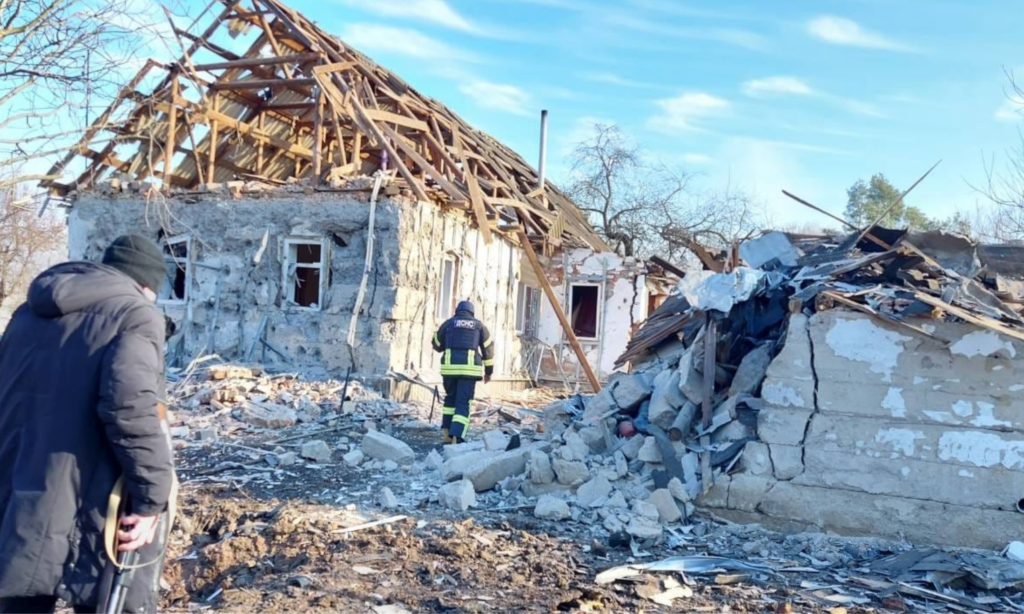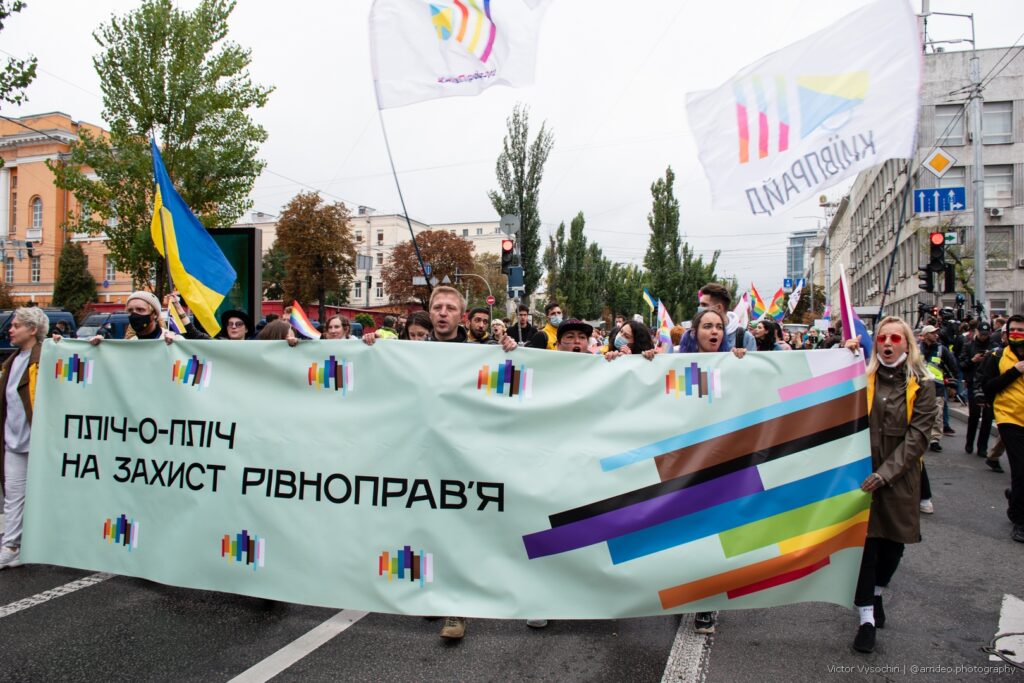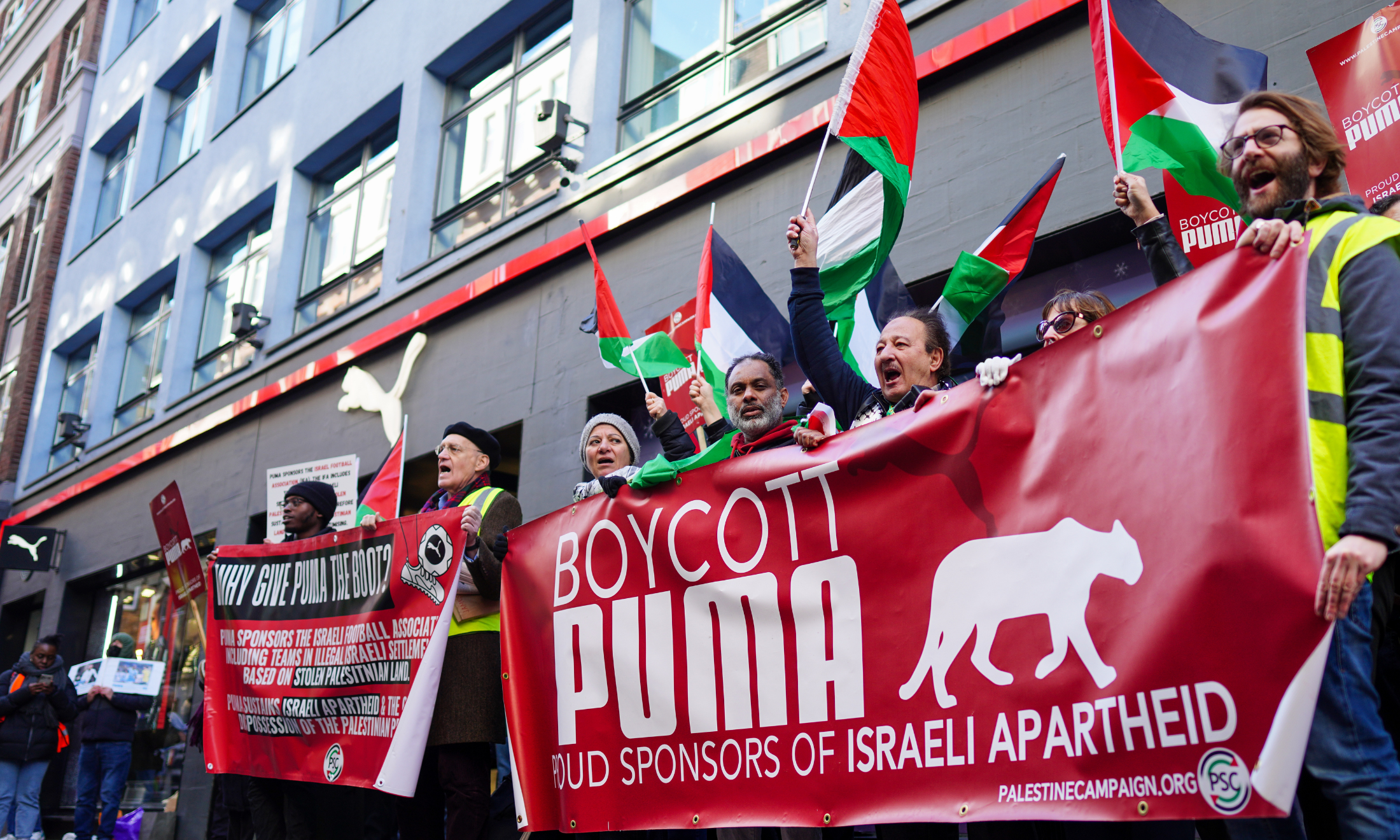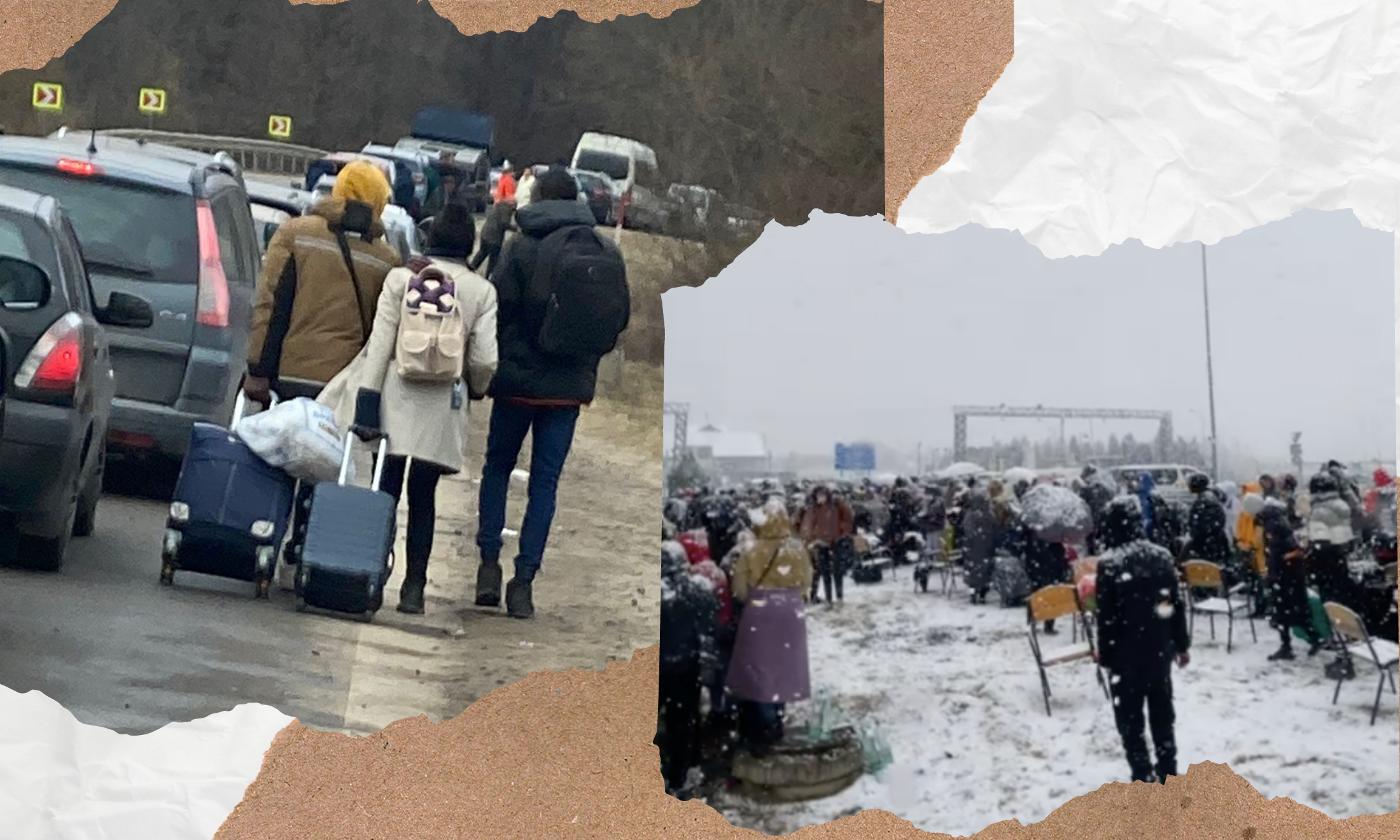
Queer Rebels
How Ukraine’s LGBTQ+ community is rallying to resist Russian invasion
The crisis threatens to derail years of progress for marginalised groups, but activists are determined to stand firm.
Asiya Ahmed
01 Mar 2022
“Please don’t panic but they’ve started bombing Kyiv,” Cay*, a non-binary queer activist with Queer Rebels, recalls hearing their partner tell them over the phone at 6:30am on Friday morning, as they awoke in their hometown of Kyiv in a state of total shock.
The previous day on 24 February, the world watched the news unfold as Russia launched a full-scale invasion into Ukraine. After months of rising tensions, the worst case scenario was underway. Russia – well prepared for the moment – unleashed terror from the north, east and south, targeting Ukraine by air, land and sea. By the early hours of Friday morning, Ukraine’s capital Kyiv was under attack. Shortly after that troubling phone call, Cay heard an explosion.
“I don’t think I can express with words what I felt at that moment,” they said. “I think that the reason why they started bombing at night is because when you wake up to bombing, you’re more prone to panic.” Their first reaction was to get dressed, grab their “go-bag” and rush to the subway to travel to stay with their father. But upon arriving at the subway station, they had more clarity, and decided to turn back.
“When you wake up to bombing, you’re more prone to panic”
Cay
As Russian President Vladimir Putin pushes his deadly invasion forward, ordinary people from all walks of life are facing devastating consequences. On 27 February, the Ukrainian Ministry of Health said that Russia’s invasion had already killed 352 civilians, including 14 children with numbers expected to rise as more cases are confirmed. A further 1,684 people, including 116 children, have been injured. A day later, the head of the UN refugee agency (UNHCR) said that since the start of the conflict, 500,000 people had fled Ukraine.
Despite the particular dangers faced by LGBTQ+ communities if Russian forces lay prolonged claim to Ukrainian territory, Cay and many other queer activists have decided to stay in Kyiv. They’re there to fight until the end.

Fearing the future
In recent years, Russia has gained notoriety for its treatment of gay people. The country passed a near-unanimous homophobic “gay propaganda” law in 2013 that bans LGBTQ+ expression – outlawing pride marches, detaining activists and cultivating a climate of hate. Five years after the bill’s introduction, hate crimes against LGBTQ+ people had doubled (though many cases are believed to have gone unrecorded). Amnesty International also condemned the “failure of the Russian state to provide justice” for victims of a wave of homophobic crimes in Chechnya.
Yevhen Trachuk, a 25-year-old non-binary activist known as Zhenya, points to Chechnya, a semi-autonomous Russia region – where there have been terrifying lethal purges against dozens of men perceived as gay or bisexual in 2017 and 2019. Putin’s ally Ramzan Kadyrov made a number of horrific statements in 2017 referring to gay people as the “devil”.
Zhenya explains why stories like these from the neighbouring region have made them afraid of the outcome of an invasion. “People were taken away, tortured and kept as prisoners. I’m afraid this could happen to Ukraine, after so many years of fighting for change,” they add.
“People were taken away, tortured and kept as prisoners. I’m afraid this could happen to Ukraine, after so many years of fighting for change”
Zhenya
Over the last few years, young queer people in Ukraine have been laying the foundations for a brighter future for the country’s LGBTQ+ community by organising large-scale Pride marches, hosting queer parties, and fighting for equal marriage and adoption rights. Although the atmosphere was still tense amidst threats from the country’s organised far-right, young people felt a shift was taking place.
“It’s hard to believe that all that I’ve been doing and everyone has been doing could just land us in prison,” Zhenya says, considering the possibility of prolonged Russian presence in the country.
Zhenya has been involved in organising successful Pride marches in the capital that have attracted thousands. While heavy police presence was necessary to protect the marchers, 7,000 people hit the streets with the ‘March for Equality’ last year, in comparison to a few hundred far-right counter-demonstrators who mobilised.
Cay took trips around Kyiv to graffiti queer messages onto the city’s walls and participated in bold actions like hanging a rainbow flag in front of Kyiv National University. They were also involved in organising a “queer-anarchist” block at Kyiv Pride and had plans to host a queer party at the end of March.

While the efforts of queer activists have made headway, same-sex marriage and adoption remain banned. In 2018, the queer community in Ukraine was fearful of a turn for the worse with the proposed anti-gay “propaganda” bill, but the law was thrown out when a Kyiv court found that the local authorities’ push for the law was “discriminatory”.
Karla believes that it was precisely the growing visibility of the LGBTQ+ community that was contributing to the shift in society. “People were feeling safer to openly share their beliefs and saw the future positively.”
Zhenya explains that back in their hometown they were the victim of a homophobic assault and that police failed to support them. They also found out that members of the far-right were circulating their photos and videos from Instagram on a Telegram channel. This type of backlash and far-right information exchange through Telegram chats is no isolated incident.
Queer resistance
“We’ve lost a lot of lives. Not just the lives of the soldiers, but also the lives of ordinary people,” says Karla*, a queer Belarusian activist based in Dnipro, a city in the east of the country. “The invasion must stop.” Like Karla, Cay and other activists are ramping up efforts to support their community and country having seen the devastation unfold.
“I have only slept a total of four hours since the war started,” Cay tells gal-dem, speaking on Saturday. “After spending most of the first two days in a bomb shelter with my friend, I’m now starting to find the energy to do something.”
After finding that so many people had already volunteered with the Territorial Defence Forces, including their partner, they decided to put their skills elsewhere. From their apartment, Cay is calling on the international community to take action, and supporting those fleeing their homes to find temporary accommodation. But, they’re also ready for more. “I’ll also be making Molotov cocktails with my friends to use against the Russian army.”
That sense of readiness is widespread among the community. “This is our capital and we need to show it’s ours,” proclaims Zhenya, who has been involved in organising Kyiv Pride. Their organisation sent a message of defiance to Vladimir Putin on Twitter as the invasion was launched. “Putin will break all his teeth trying to bite us. We have left far behind the past to which he seeks to draw us,” they wrote.
“This is our capital and we need to show it’s ours”
Zhenya
Zhenya describes how Ukraine’s queer community is mobilising in the resistance against Russia’s invasion. “Some of the queer community is fighting in the war, while others are helping with supplies and donating blood to medical centres.” Gay men only gained the right to do this in 2016 in Ukraine.
They also point to the importance of psychological support networks that have been set up, as well as transport and accommodation networks to help those fleeing. “Being silent and doing nothing is an awful way to be in this situation,” they say. “Everyone is playing their part.”
Battles are not just taking place on the ground. NPR has reported that a Ukrainian cyber-security executive has recruited hackers from around the world to engage in the cyber-warfare taking place. With phishing attacks rolling in against Ukrainians, Karla joined the combat against digital threats. As part of a wider operation, her role is to check and verify the IP addresses of those sending the phishing emails, while others work to block the ‘phishers’.
The activists expressed that the international response, which has taken place in the form of financial sanctions on Russia and military support for Ukraine, has been too slow. “The international community needs to respond more quickly to the war. That should happen not only with Ukraine, but also with other countries facing war,” says Karla.

Standing firm
Tens of thousands of protesters have taken to the streets around the world to demand an end to Russia’s military invasion of Ukraine and call on the international community to take action. In Russia too, anti-war protesters have turned out across 48 cities, facing crackdowns and arrests by security forces.
Back in Ukraine, imagining life after the war is close to impossible for people on the ground. “I still can’t believe that the war is happening right now. It’s very complicated to imagine and plan how I’ll live afterwards,” says Karla.
While acknowledging the blocks and threats faced by the LGBTQ+ community in Ukraine before, Zhenya stresses that a Russian takeover would mean a bleak fate for queer people and significant set back their struggle for rights and dignity.
“I’m staying in Kyiv and not going anywhere. We’ll keep fighting for our freedom”
Cay
Cay, Karla and Zhenya are standing firm and ready to do whatever it takes to support the ongoing resistance. While Karla confronts the digital threats from her apartment in Dnipro, Cay is ready for the battle on the streets. “I’m staying in Kyiv and not going anywhere. We’ll keep fighting for our freedom,” says Cay.
On 28 February, Zhenya left Kyiv temporarily, but they’re committed to staying in Ukraine and ready to keep queer culture alive no matter what happens – even if it takes “going underground” to avoid repression. “People before me did it, so why not? I want to support the country and the culture,” they say as they look towards a new future.
*Names have been changed to protect identities
Like what you’re reading? Our groundbreaking journalism relies on the crucial support of a community of gal-dem members. We would not be able to continue to hold truth to power in this industry without them, and you can support us from £5 per month – less than a weekly coffee.
Our members get exclusive access to events, discounts from independent brands, newsletters from our editors, quarterly gifts, print magazines, and so much more!

It’s been 200 days. What’s happening to Brittney Griner?

The ‘Homes for Ukraine’ scheme is yet another way for the government to shirk responsibility

Turns out the West understands boycotts, sanctions and divestment when it comes to Russia






